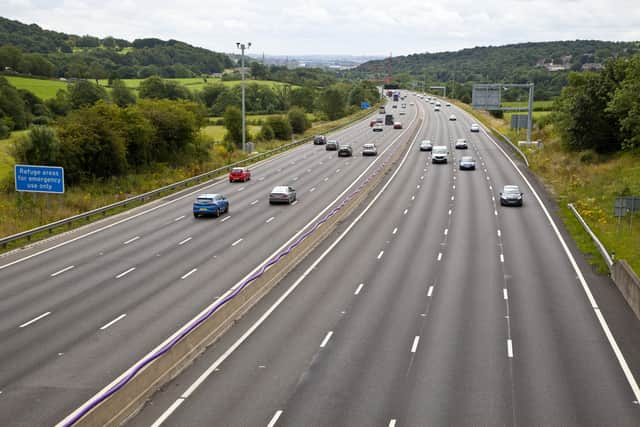New smart motorways roll-out halted amid safety concerns
The UK Government has paused the roll-out of all lane running (ALR) smart motorways amid doubts over their safety.
The Department for Transport said it would halt the introduction of the controversial roads until five years’ worth of safety data has been collected and analysed.
Advertisement
Hide AdAdvertisement
Hide AdConcerns have repeatedly been raised over the safety of the roads, which use the hard shoulder as a permanent live traffic lane, and in November MPs said the Government had been “premature” in declaring that all new smart motorways would be ALR.
The Commons Transport Select Committee said that there was not enough safety or economic data to justify continuing the smart motorway roll-out and called for a pause while more information was gathered.
Fears over the roads’ safety centre on the risk of a broken-down vehicle being trapped in a live lane and struck by following traffic.
The DfT has now said it will follow the committee’s recommendations and pause any ALR scheme where construction has not yet started. It has also committed to investing £900 million upgrading safety on existing stretches, including spending £390m adding more emergency refuge areas.
However, it said that work on stretches already under construction would continue as halting progress would cause “significant disruption” for drivers.
Transport Secretary Grant Shapps said he “shares the concerns” of safety campaigners.
He said: “While our initial data shows that smart motorways are among the safest roads in the UK, it’s crucial that we go further to ensure people feel safer using them.
“Pausing schemes yet to start construction and making multimillion-pound improvements to existing schemes will give drivers confidence and provide the data we need to inform our next steps."
Advertisement
Hide AdAdvertisement
Hide AdOpponents of the scheme say the actions don’t go far enough.
Claire Mercer, whose husband Jason was killed on an ALR stretch of the M1 in 2019, said today’s announcement was a missed opportunity.


She said: “We have had review after review after review into smart motorways and never once have they turned off the first lane while they investigate them.
“Just turn off lane one and you’ve got your hard shoulder back.
“They’d take lots more steps a lot more quickly if it was their loved ones that were being killed or maimed.”
Conservative MP Sir Mike Penning, who claims he was misled when he supported the rollout of the motorways in his role as roads minister, said: “It seems illogical to pause the rollout of new all lane running sections on the basis that more safety data is needed, but to allow existing ALR sections to continue to operate.
“Either we are happy that ALR is safe or we’re not. If there is any reasonable doubt, which there clearly is as they wouldn’t be pausing the roll out of new sections if there wasn’t, then we should stop using them.”
The RAC’s head of roads policy Nicholas Lyes called the announcement an “unqualified victory for drivers” and said the Government should reconsider other types of smart motorway that retain a hard shoulder.
Advertisement
Hide AdAdvertisement
Hide AdHe said: “Rather than ploughing on regardless in the face of mounting public opposition, we’re pleased the Government has finally hit the pause button and given itself time to fully consider the safety of these schemes, and the way our motorways are adapted to increase capacity from now on.
“We have long argued that dynamic hard shoulder and controlled motorway schemes – both of which feature a hard shoulder in some form – should be considered given their good safety record and it’s important these options are on the table.
“The safety of our motorway network is paramount and no policy decisions should ever risk making our fastest roads less safe.”
AA president Edmund King also supported the idea of controlled motorways, where the hard shoulder could be used as a traffic lane at peak times. He said: “The AA has been a major critic of smart motorways in our campaign for over a decade to improve their safety. At last, we have a Transport Secretary who has made progress and taken a positive and pragmatic approach.
“We would like further investigation, which the Transport Secretary has agreed to, of our proposal for all lane running schemes to revert to the hard shoulder between 7pm and 7am to avoid confusion and to offer a refuge to counter live lane collisions that happen at night.”
Comments
Want to join the conversation? Please or to comment on this article.
